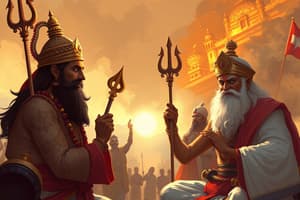Podcast
Questions and Answers
Match the following historical figures with their contributions to Indian social reform movements:
Match the following historical figures with their contributions to Indian social reform movements:
Rajaram Mohan Roy = Introduced reform in education and socio-religious pursuits Dayanand Saraswati = Contributed to social reform movements in the north Jyotirao Phule = Introduced reform in education and socio-religious pursuits Romila Thapar = Discussed the intertwining of religion and politics in India
Match the following events with their impact on Indian politics:
Match the following events with their impact on Indian politics:
Act of 1909 = Granted reserved seats in the legislature and a separate electorate for Muslims British rule in the 19th century = Pitched one community against the other to weaken the freedom struggle Beginning of the nineteenth century = Marked by social reform movements and disruption of traditional social ties Introduction of religion in politics = Linked to the country's pre-independence era and the British rule
Match the following concepts with their impact on Indian society during British rule:
Match the following concepts with their impact on Indian society during British rule:
Transport and communication changes = Brought about by British rule but disrupted traditional social ties Fragmentation of culture = Resulted from the disruptive impact of British rule Infusion of anxiety among Muslims = Concerning their wellbeing in a country with a majority Hindu population and emerging Hindu Nationalist voices Reserved seats for Muslims in the legislature = Granted as a result of demands and legislation during British rule
Match the following reform movements with their leaders and their methods of raising national consciousness:
Match the following reform movements with their leaders and their methods of raising national consciousness:
Match the following ideologies with their impact on Indian politics:
Match the following ideologies with their impact on Indian politics:
Match the following groups of historians with their perspectives on communalism in India:
Match the following groups of historians with their perspectives on communalism in India:
Match the following concepts with their role in Indian politics:
Match the following concepts with their role in Indian politics:
Flashcards are hidden until you start studying




